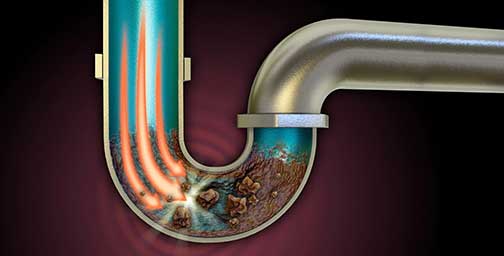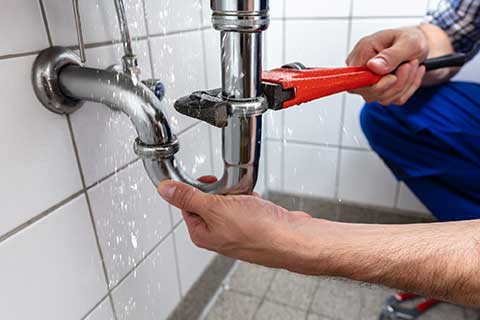
Clogged drains are not just a mild inconvenience as some people might consider. They can cause serious harm to the property, warns Whole Property Management. If you start to notice a clogged drain in your home, you need to respond urgently. But how do you identify a clogged drain?
Signs of clogged drains
Slow-moving drains
Pipes and drains do not block altogether at once. The blockage builds up gradually over time. As the debris keeps accumulating inside the drain, it slows down the movement of wastewater. So, if you notice that your drain is slowing down, it means a clog is developing in the drain.
However, if all your drains are slowing simultaneously, you may be dealing with a clogged sewer line. On careful observation, toilet drains are the first to slow down if the sewer line develops a clog. Water may hang on for a while before it gradually sinks as you flush the toilet following this occurrence.
Gurgling sounds
When clogs develop in your drain, they hinder the free flow of wastewater. Pipes conduct sound, and as a result, you may notice weird noises when wastewater drains through your plumbing fixtures. People commonly describe these noises as gurgling sounds when using the drain. Sometimes, you may observe it as bubbling, trickling, or hissing sounds. Cases that affect the main sewer line may experience these weird noises for a long time after you stop using the drain.
Clogged plumbing fixtures
A clogged plumbing fixture is a late sign. In this case, there is already a severe or complete blockage of the pipe. As a result, almost no water can flow through the drainpipe. You may notice this if your tub fills up as you are trying a shower or the sink overflows as you are using it.
The consequences of having a clogged drain

Remember that you pour or flush items into the drains. Such things may include waste, food, gunk, hair, etc. These items will accumulate within the pipe and lead to clogging.
Unpleasant odors
Why do you experience unpleasant odors when you have a clogged drain? Remember that you pour or flush items into the drains. Such things may include waste, food, gunk, hair, etc. These items will accumulate within the pipe and lead to clogging.
As a result, bacteria will have a suitable environment to grow and cause decay. The decay will present itself as terrible odors emanating from your drain. In addition, these odors will not stay within the pipes alone. They will also spread to other areas of the home. Imagine perceiving an unpleasant odor throughout your property. It can be upsetting to guests and neighbors.
Pest infestations
Several types of pests may infest a property that is experiencing clogged drains. The reasons are that unpleasant odors from the drain will attract pests, and the stagnant water will provide a suitable environment for them to thrive. Mosquitos and other insects multiply by laying their eggs in stagnant water. If food particles clog the drain, they will serve as a food for the pest.
Clogged drains will attract the following insects:
- Drain flies (moth flies)
- Phorid flies
- Cockroaches
- Fruit flies
Health hazards
Clogged drains provide an unhealthy environment in the home. Remember that the pipes harbor bacteria and produce unpleasant odors. These bacteria can contaminate your drinking water and cause harmful infections.
Symptoms of such illnesses may present as fever, diarrhea, or vomiting. Common bacteria that may spread because of clogged drains include salmonella, campylobacter, helicobacter, etc. Unpleasant odors from clogged drains can cause nausea, vomiting, dizziness, headaches, anxiety, mood swings, and irritations to the throat, eyes, and nose.
Pest infestation during clogged drains also helps in spreading germs. After nesting inside clogged pipes, these pests may perch on your food, plates, or drinking water.
Molds also grow because of clogged drains. The effects of mold growths in your home may present as allergies or respiratory diseases.

After pooling for some time, water will start leaking through the pipe joints, seals, and caulking.
Plumbing leaks
Water will always find a way to escape. When drains clog, the wastewater will back up within the pipes. After pooling for some time, water will start leaking through the pipe joints, seals, and caulking. Depending on the size of the leakage, some homeowners may not notice it immediately.
Structural damage
Gradual leakage of plumbing fixtures into the soil and surrounding structure can affect the property. If it happens close to the foundation, the structural integrity will weaken.
Severe drain clogs will cause wastewater to back up into your home. As a result, your home may experience flooding. Depending on the type of flooring, floods in the home may damage the floors. When this happens, the repairs are usually expensive.
The bottom line
It is advisable to treat a clogged drain as an emergency. When you notice that you are experiencing clogged drains, turn off the water supply to your home and call a local plumber. Plumbers have the appropriate tools, training, and skills to locate the problem inside the drain or offer professional drain cleaning solutions such as high-power hydro jetting.